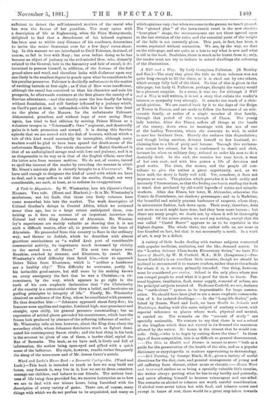A Will and a Way. By Lady Georgiana Fullerton. (R.
Bentley and Son.)—The story that gives the title to these volumes was not quite long enough to fill the three, so it is eked out by two others, which occupy fully half of the third. No hint of this is given in the title-page, but Lady G. Fullerton, perhaps, thought the variety would be a pleasant surprise. In a sense, it was so ; for although A Will and a Tray is well written, it is not a story that enlists the reader's interest or sympathy very strongly. It smacks too much of a clois- terish pietism. We are carried back by it to the days of the Reign of Terror in France, and are made to follow the fortunes of an aris- tocratic family, or rather of a single member of that family, through that period of the triumph of Chaos. The young lady heroine, Aline des Elmes, suffers all things at the hands of the enemy, down even to marriage with the son of one of the leading Terrorists, whom she consents to wed, in order to save her brothers' lives. Bravely she endures this degradation ; and though loving another, devotes herself to her husband, re- claiming him to a life of piety and honour. Through this reclama- tion comes her release, for he is condemned to death and shot, because he, when on military duty, refused to order his men to do a dastardly deed. In the end, she marries her true lover, a man of her own rank, and with him passes a life of devotion and good works. The time, the scenes, and the people all con- tribute to give the author a great opportunity, and, as we have said, the story is fairly well told. Yet, somehow, it does not impress us much. The pietism which pervades it is both sickly and intensely Ultramontane, so that the feeling one has in reading the book is much that produced by old-world legends of saints and miracle. workers. Aline des Elmes, her lover, M. Alexandre, otherwise the Comte de Courtelance, are shadowy personages; and so is Madeline, the beautiful and saintly peasant harbourer of suspects, whom they, in aristocratic fashion, look down upon. Their story, therefore, does not move us as it might have done, had they been more human ; but there are many people, we doubt not, by whom it will be thoroughly enjoyed. Of the minor stories, we need say nothing, except that the one called "Castel Barco" appears to us to be repulsive in the highest degree. The whole three, the author tells us, are more or less founded on fact, but that is not necessarily a merit. In a work of art, it may be a defect.


































 Previous page
Previous page